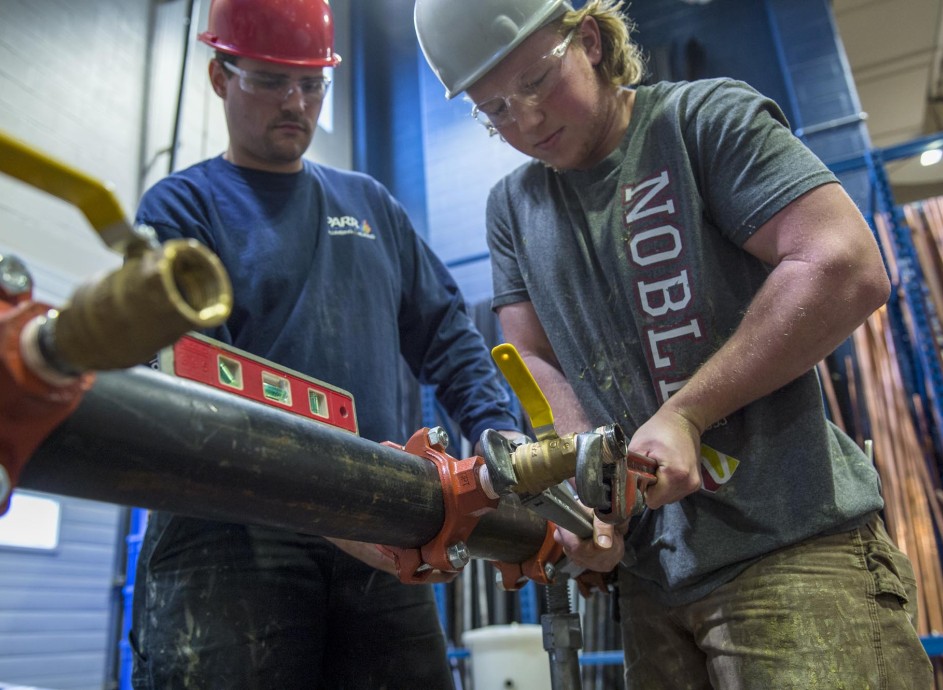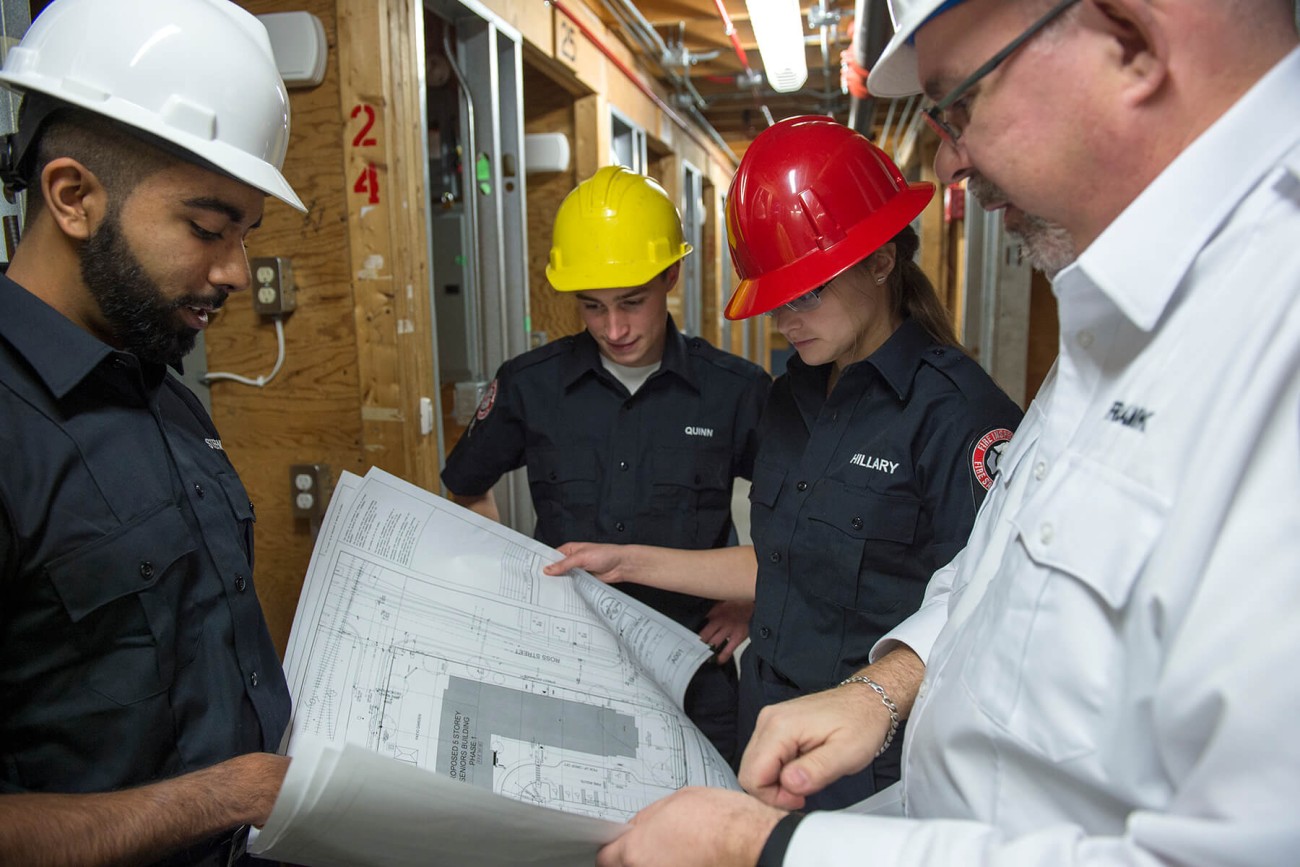
Program Overview
Program Details
Full Time Offerings
Full Time Offerings
Your Learning Experience
One of the most critical questions about any property – from a school to a factory to an apartment building is how safe will people be if a fire breaks out? After completing the Fire Safety Systems certificate program, you can be the person to ensure that others are adequately protected in the event of a fire.
As a fire alarm technician student, you’ll be given training in the skills required to perform various technical functions, including the assessing and maintenance of fire alarm and sprinkler problems. You’ll learn the ins and outs of the codes, legislations, and standards that protect property owners.
Additionally, you’ll be provided with hands-on experience and fire safety training to ensure that property owners have fire detection devices that are correctly installed. Finally, the Applied Fire Safety Practices course will allow you to demonstrate the skills you’ve learned in a workplace environment.
The public wants to know they are safe when they are in buildings, and it can be your job to help them feel that way with the Fire Safety Systems Program
This program is recognized by the Canadian Fire Alarm Association. Upon completing this program, you will qualify as a CFAA Registered Trainee Fire Alarm Technician.
As a student, you’ll be given the knowledge and training in the skills required to understand how fire alarm systems monitor and control other building systems, sprinkler and HVAC. The program also provides training in the skills required to perform various technical functions involving the assessing and maintenance of fire alarm systems. Graduates will be able to assist in providing required verification inspections of new systems, yearly required inspections of all existing systems and miscellaneous trouble calls of many varied causes.
Additionally, you will learn the detailed requirements of codes, legislation and standards designed to offer an ever-increasing level of life safety. The combination of basic electrical & electronic knowledge, specific fire alarm-related theory, hands-on understanding of sprinkler systems, and practical work experience will increase the level of competence in the industry.
Career Information
The extensive hands-on experience you receive will prepare you for the complex building life safety systems you will be working on, ensuring their proper installation and operation. In addition, during your lab time, you will experience a workplace environment demonstrating the fire alarm technical skills you have been taught. The Fire Safety Systems Program will prepare you for a career working for fire alarm contractors, manufacturers, wholesalers, electrical power plants, hospitals, schools and other organizations in the fire safety industry.
Here are some examples of career opportunities for graduates of Fanshawe’s Fire Safety Systems program:
Fire Sprinkler Designer
Design, install, inspect, service and maintain fire sprinkler equipment in commercial and community facilities.
Fire Alarm Sales Consultant
Lead fire alarm sales and customer service support throughout an assigned geographic region.
Fire Alarm Technician
Inspect, monitor, service and maintain fire alarm systems as required by law.
Program Progression
Fall (September) start date:
| Fall | Winter |
|---|---|
| Start Level 1 | Level 2 |
Learning Outcomes
The graduate has reliably demonstrated the ability to:
- Assess the functionality of fire alarm systems
- Assess and maintain basic life safety electronics
- Assess and maintain basic life safety electrical systems
- Write technical reports to industry standards
- Assess a structure to determine if all relevant fire codes, legislation, and standards are met
- Describe extinguishing methods for special hazards
- Describe the basic components of water-based sprinkler systems
- Install, verify and test a variety of fire alarm systems
- Troubleshoot issues in a variety of fire alarm and sprinkler equipment
Academic School
Program Coordinator:
Frank Donati
Admission Requirements
OSSD (with courses from the College (C), University (U), University/College (M), or Open (O) stream), or equivalent, or mature applicant.
Students who do not have a high school diploma may wish to consider taking the Academic and Career Entrance (ACE) grade 12 Equivalency Certificate.
International Admission Equivalencies
English Language Requirements
English Language Requirements
| Test | Score |
|---|---|
| TOEFL iBT | 79 |
| IELTS Academic | Overall score of 6.0 with no score less than 5.5 in any of the four bands |
| CAEL | Overall score of 60 with no score less than 50 in any of the four bands. score of 80 in listening |
| PTE Academic | 53 |
| Cambridge English | Overall score of 169 with no language skill less than 162 |
| ESL4/GAP5 | Minimum grade of 80% in Level 8, 75% in Level 9, or 70% in Level 10 |
| Duolingo | Overall score of 105, with no score lower than 95 |
Recommended Academic Preparation
Recommended Academic Preparation
Grade 12 Mathematics for College Technology (C) OR Grade 12 Foundations for College Mathematics (C)
Applicant Selection Criteria
Applicant Selection Criteria
Where the number of program eligible applicants exceeds available spaces, the Applicant Selection Criteria for this program will be:
1. Preference for Permanent Residents of Ontario
2. Receipt of Application by February 1st (After this date, Fanshawe College will consider applicants on a first-come, first-served basis until the program is full)
3. Achievement in the Admission Requirements
Courses
| Level 1 | ||||
| SYST-1024 | Fire Detection & Alarms-Intro | 3.5 | ||
This course provides a general understanding of fire alarm protection systems. It discusses the purpose and specific application of the different codes and standards that regulate the industry. It introduces the student to architectural considerations regarding fire containment. Information about testing laboratories, their procedures, testing methods and how listed/ approved materials achieve greater degrees of life safety will be covered. Other topics include; the nature of fire, extinguishment methods, fire alarm testing methods, interpretation of drawings, specifications and other contract documents. | ||||
| SYST-1025 | Codes, Legislation & Standards 1 | 3 | ||
This course introduces students to the codes and legislated requirements for fire alarm systems and how they relate to Ontario building code, Fire code and electrical code. Students will learn about AHJ's and the requirements for building owners. | ||||
| SYST-1026 | Fire Sprinkler Systems-Intro | 3 | ||
This course introduces design principles and systems required for fire protection systems. Students learn about fire sprinkler system design, and components of dry pipe, wet pipe and shotgun systems. Students learn how to identify, inspect and test sprinkler systems in fire protection systems. | ||||
| ELNC-1111 | Life Safety Systems Electronics 1 | 2 | ||
This course focuses on the Digital Electronic components and operating principles associated with modern Life Safety Systems. Students will explore various numbering systems used in modern electronics, operating principles and characteristics of Logic families and Logic Gate Applications as well as other Digital System components. In the lab, students will build, test and troubleshoot various digital circuits both from a board level and at the system level. | ||||
| ELEC-1138 | Basic Electricity | 2 | ||
This course focuses on the basic electrical theory required to install, test and repair modern Life Safety Systems found in commercial and industrial facilities. Lectures will cover the fundamentals of Electrical theory such as Current, Voltage and Resistance. Students will develop an understanding of the principles of DC Series, Parallel and Combination circuits as they relate to Safety Systems, In the lab, students will wire and troubleshoot various circuits and perform voltage, current and power measurements related to DC circuits and systems. | ||||
Tuition Summary
London
*Total program costs are approximate, subject to change and do not include the health and dental plan fee, bus pass fee or program general expenses.



